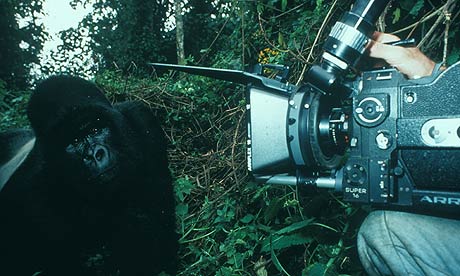BBC still walking with dinosaurs when it comes to climate change
The BBC's output treats the findings of thousands of scientists on climate change as no more than 'views' or 'opinion'

TV Cameraman filming gorillas in the wild. Photograph: Rex Features
Years ago, when dinosaurs still roamed the earth, I worked for the BBC's natural history unit as a radio producer. It was a great job, and my colleagues were stimulating and fun. I was allowed to make investigative environmental programmes, and we exposed some shocking scandals. We recorded the head of customs in Abidjan offering to sell us smuggled chimpanzees, for example, and we found that a bulk carrier which crashed off the coast of Cork, polluting rare habitats, appeared to have been deliberately scuppered.
After Mrs Thatcher launched her coup against the BBC, its executives quickly lost their appetite for investigative programmes, and my boss explained that we no longer had the support we needed to continue. Since then the natural history unit has continued to broadcast beautiful, thrilling programmes about the world's wildlife. Occasionally it makes an environmental programme. But by and large it presents the biosphere as if it inhabits a planet yet to be discovered by human beings (except of course the cameramen you see struggling with the elements in the "how we made it" segments).
The most extreme example was the three-part series on the Congo made for the BBC by Scorer Associates. At the height of a devastating civil war which had caused the deaths of some 4 million people, the series reported that "the Congo may once have been known as the 'heart of darkness' - today it seems more like a bright, beautiful wilderness." In two and a half hours of programmes the killings were not mentioned.
Lovely as the unit's output remains, I believe that it creates a misleading impression of the world, which can have grave political consequences. It encourages people to believe that all is well with the world's ecosystems; often it produces the only footage viewers see from far-flung parts of the world. I am not arguing that the political or environmental context should dominate the unit's output, only that it should be acknowledged and explained, however briefly. Is this too much to ask?
Yes, apparently. For the past few years an environmental campaigner called Peter Hack has been writing to the BBC asking about one of these gaps. As far as he can discover, over the past 17 years (since the 1992 Rio earth summit in other words) of BBC films about the ecosystems of east Africa, there has not been a single mention of climate change. Yet these places have been hit harder than almost anywhere else by changes in weather patterns. Kenya, for example, has suffered a series of extreme droughts, whose frequency appears to be unprecedented. These have direct and immediate impacts on the region's wildlife. But watching Big Cat Diary or any of the other films the unit has made in the Serengeti, Maasai Mara and other great parks and reserves, you wouldn't have the faintest idea that anything had changed.
Peter Hack has just shown me the latest letter he's received from Gerald McCusker at BBC Information. McCusker explains the gap thus:
"It's not always possible or practical to reflect all the different opinions on a subject within individual programmes and we feel that over a reasonable period our coverage will reflect a diverse range of views and opinions with regard to this issue."
So it turns out that the entire science of climate change, the work of thousands of researchers, the tens of thousands of papers published in scientific journals, the indisputable facts about changes in temperature, precipitation and wildlife populations in east Africa is no more than a "view" or "opinion". Nice to know where you stand, isn't it?

No comments:
Post a Comment